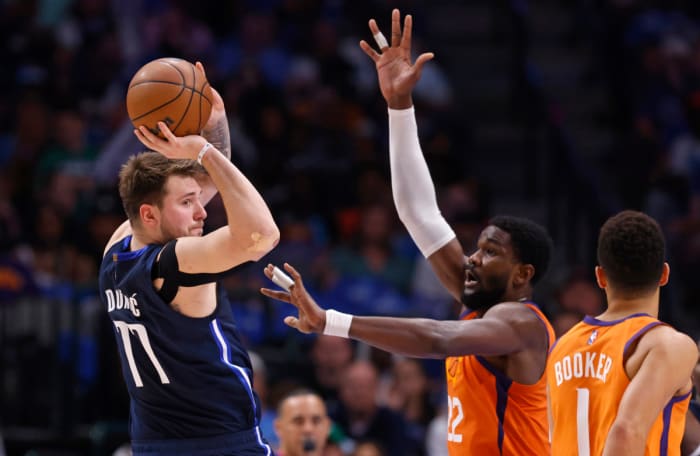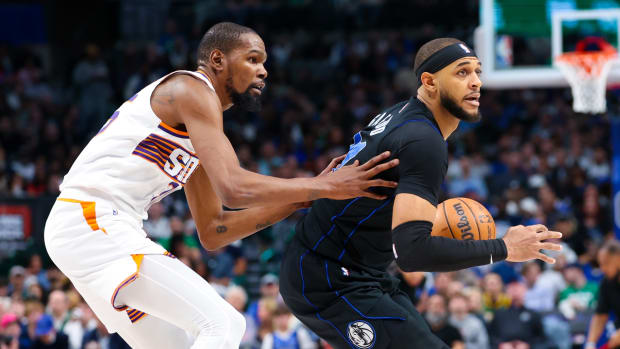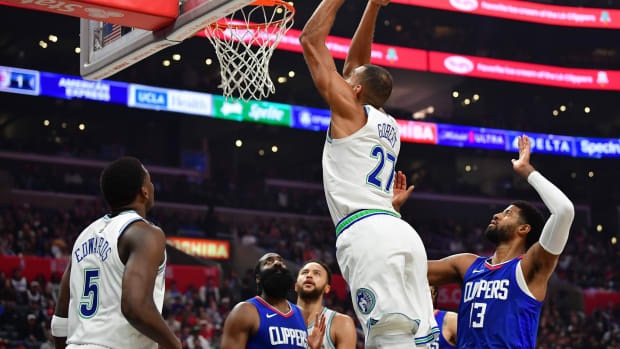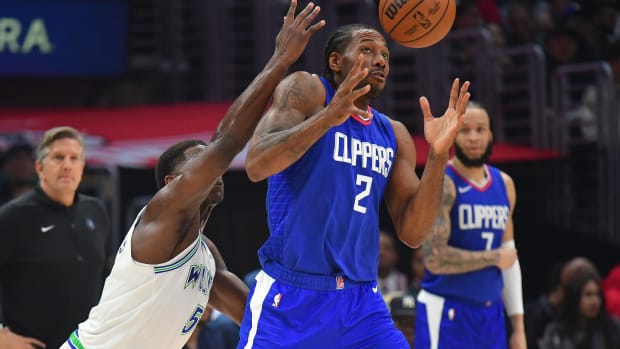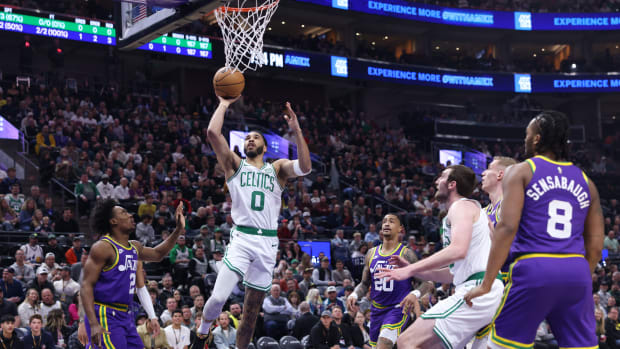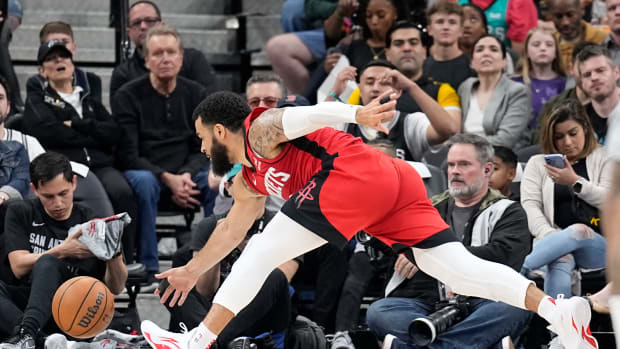Phoenix’s first trip to Dallas during its second-round series against the Mavericks was an eventful one. Before the team flew out last Thursday for Game 3, the Suns were grounded in Arizona for an hour due to storms in Dallas. The delay forced them to practice late in the evening upon arrival and scurry out of the bowels of Dallas’s downtown arena minutes before “The Who” took the stage that night.
Things didn’t go much better the next day on the court. The Suns would lose Game 3—a game in which Chris Paul committed seven turnovers on his 37th birthday. Luka Dončić, meanwhile, was proving a difficult cover, having averaged 35.3 through the first three games. So when Coach of the Year winner Monty Williams—who led Phoenix to the Finals last year and had to face MVPs such as LeBron James, Nikola Jokić and Giannis Antetokounmpo during that run—was asked after the game if he enjoys the adjustments and strategic pressure that come with managing a playoff series, he was only half-joking when he answered.
“Does it look like I’m having fun?” he said.
There is nothing enjoyable about trying to slow down one of the greatest scorers in postseason history. That’s the task for the No. 1 seeded Suns in their back-and-forth, hotly contested matchup with the Mavericks in the second round.
In his brief postseason career, Dončić has already proven to be one of the most lethal offensive weapons in the NBA’s second season. Through 21 career playoff games, Dončić’s 32.5 points per game average is second only to Michael Jordan. And scoring is only one aspect of what makes the Slovenian star great: His passing can be equally devastating, especially when Dallas decides to surround him with shooters. (Dallas averaged 10.1 corner threes per game this season—fourth-most in the league. That has increased to 11.5 in the playoffs, most of any remaining teams, a credit to the attention paid to Dončić.)
On the other side of the ball from this one-man force is Phoenix, which posted the third-best defensive rating during the regular season. The Suns boast one of the game’s top perimeter defenders in DPOY runner-up Mikal Bridges, savvy vets in Paul and Jae Crowder, and a burgeoning rim protector in Deandre Ayton. And through the series’ first five games, in which the Suns lead 3–2, Phoenix has had the slight upper hand in slowing down Dončić.
Emphasis on slight.
In the most basic terms of engagement in this series, the Suns have had to figure out how to stop Dončić in the high screen and roll, essentially the staple action for nearly every great scorer in the playoffs. And that starts with Bridges, who has guarded Dončić for 20 minutes of game time longer than any other Maverick this series.
“To play against unbelievable talent, it challenges me personally,” Bridges told SI after Game 1. “It makes me better as a player. I embrace the challenge for sure.”
In an ideal world for Phoenix, Bridges and whichever big man is in the game—Ayton, Javale McGee, or Bismack Biyombo—can contain Dončić and his screener with only two defenders. While switching is en vogue in the NBA, the Suns prefer to drop their center in most scenarios. A perfect Phoenix possession would see Bridges fight through a screen and catch up to Dončić before he gets deep in the paint, giving his big enough time to recover to the screen setter.
But it’s rarely that simple with Dončić. He is adept at keeping his initial defender on his back hip after receiving a screen. He’s one of the best scorers from the nonrestricted area of the paint, which means once he starts even sniffing the elbow your defense is already in deep trouble. And though he’s not yet fully consistent from three, you have to respect Dončić’s ability to step back beyond the arc, because if he gets going from deep, at that point your fate is in his hands.
In every game of this series, at some point the Suns have had to stop dropping and start switching because of Luka’s scoring prowess. This is the moment help defense comes into play, and this is arguably the crux of this series and the most important aspect of what the Suns do when Dallas has the ball.
“Our plan is to defend the ball,” McGee says. “We try not to overhelp because he has an amazing passing ability of getting in the paint, looking like he’s going to shoot, and passing to a wide-open man for a three.”
The threes have been a key for Dallas in the playoffs. The Mavericks abused their first-round opponent, the Jazz, by spacing the floor and attacking weak perimeter defenders. Once a Dallas ballhandler was headed toward the rim, Utah’s help defenders would be forced to collapse into the paint and that would create open threes that were oftentimes only one pass away.
Phoenix has fallen victim to that strategy as well this series. The Mavs shot nearly 41 threes a night through the first four games of the series, including 44 in their Game 4 win. Whether the Suns were in drop or switching all screens, their attempts to stop Dončić opened up opportunities on the perimeter, because whoever was off the ball was shaded in his direction.
And here is where the detail of playoff basketball becomes incredibly important, even if almost imperceptible unless you’re paying as close attention as possible. If you’re Jae Crowder, for example, and you’re covering a shooter on the wing, how do you decide how far off your man you’re willing to go when Dončić has earned himself a favorable switch at the top of the key? One foot in the paint or none? Do you lean on film? Instinct? The feel of the game?
“I think you put all those things into one,” Crowder said. “Once you get in the game you gotta read and react. You have to truly know the rotations, you have to know what your teammates are doing. Obviously knowing your opponent is probably the No. 1 thing, and knowing what the Mavericks are trying to do on the offensive end.
“Dončić does a great job of reading the game and knowing where all his teammates are on the court. We’re playing chess right now.”
Crowder is fond of saying the playoffs start as a chess match before eventually turning into a mano a mano battle. At some point, what’s happening on the floor can’t be coached. You either stay in front of your man or you don’t. Like when McGee is on the court, Dončić is almost certainly going to try to attack him in a switch. Just because that’s a favorable matchup for Dallas, McGee isn’t going to simply concede a basket.
“My gameplan is to guard him the way a guard would guard him,” says McGee, who actually stripped Dončić and scored the other way on a one-man fastbreak in Game 1. “I’m not looking for help. If he shoots that stepback three, hey, he makes that on everybody. But those drives to the rim where he’s bullying guys, getting it on the rim or dishing out, I’m in there and trying to lock that up.”
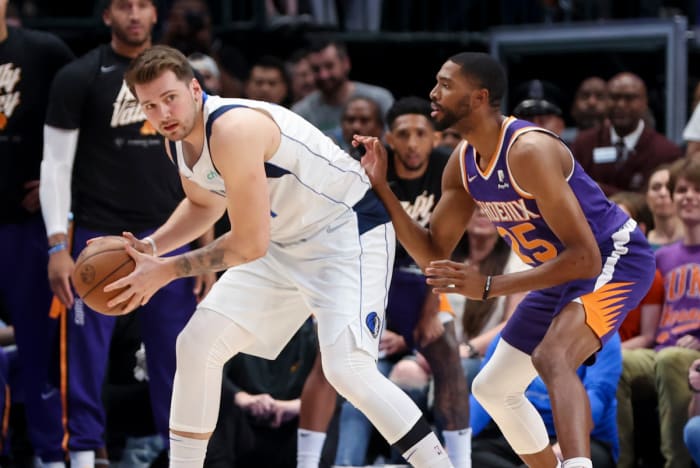
Bridges has been the Suns’ primary defender on Doncic throughout the series.
Kevin Jairaj/USA TODAY Sports
McGee mentions that, against Dallas, Phoenix’s bigs have to think like a guard, particularly when the Mavs go to their five-wide look and bring in Maxi Kleber for Dwight Powell. Through the first four games of the series, the Luka-Kleber–Jalen Brunson–Reggie Bullock–Dorian Finney-Smith five-man group posted an 18.8 net rating, including a blistering 121.9 offensive efficiency. In that lineup, Phoenix is typically forced to switch more often, and one misstep by a help defender can lead to an easy pass for Dončić and a wide-open three for one of his shooters. Communication is key here. In every pick and roll, the Suns are talking to each other about which way to send the ball-handler, when to switch, and where the help is coming from.
In Game 4, despite the Suns’ commitment to not overhelping, that’s exactly what they did. Dončić scored only 26 points on 9-of-25 shooting, but he posted a series-best 11 assists. After the game, Williams lamented the extra steps his defenders took off Dallas’s shooters, mentioning that perhaps it would have been better to live with Luka’s stepbacks. (Dončić shot only 1-of-10 from three that night.)
In Game 5, Phoenix didn’t come out with a radically different defense. While Cam Payne—who has struggled on both ends of the floor against Dallas—was excised from the rotation, the Suns didn’t have some kind of eureka moment and gin up a wholly new scheme to slow down the Mavs. Instead, their positioning was better on the shooters, staying a half or full step closer to the perimeter. And Williams had to trust his point-of-attack defenders to win their mano a mano battles more often against Dončić. The result? The Mavs shot and made their fewest number of threes in the series. And for good measure, Dallas also finished Game 5 with its lowest assist total of the second round.
“When they’re set they’re one of, if not the best defensive team in the NBA,” Dončić said postgame. Mavs coach Jason Kidd added the Suns did a good job preventing the Mavs from getting into the paint, which forced Dallas to settle for isolations as opposed to kickouts.
“They will live and die by the three,” Ayton said after the game. “They have great shooters over there, and you just got to have a certain sense of urgency when you’re closing out to them, because they can put the ball on the floor as well and have you in a blender, closing out and being late on passes. … But at the end of the day, we accepted the challenge, man. We accepted the one-on-one guarding and standing in front of the ball, and I’ve seen that.”
As counterintuitive as it sounds, Phoenix’s best option to close out this series may be to let Luka go one-on-one and see if he has the stamina to do it for four quarters. Trading open threes for contested twos is probably a better proposition for the Suns. And unlike the Jazz, Williams has the defenders to employ such a strategy, because while Phoenix may not win every switch, it's also not allowing a layup line at the rim. While Luka can dominate on post-ups or try to bully his way into the paint, it’s also very tiring to play that way when Dallas doesn’t seem keen on utilizing its other ballhandlers too often. Staying home on the shooters also prevents them from getting in a rhythm, as they were in Game 4 when Finney-Smith and Davis Bertans combined to shoot 12-of-18 from deep.
Of course, there are still myriad adjustments to be made on both sides of the ball for either team that could affect the course of this series. Williams made sure to point out after one of the practices in Dallas that coaches are tinkering from the start of the regular season, though he did admit in the playoffs he has to find the balance between overreacting and making the right tweaks.
“We understand the team we are,” McGee says. “We’re the team that won 64 games. We understand that we’re not going to win every game. We definitely have an appropriate fear. We know coming into a series we may lose one or two. We don’t want it, but it’s possible. But that’s why we have days in between to get right and get back to our dominant ways.”
The tweaks the Suns made between Games 4 and 5 clearly led to a dominant performance. But the Mavs will certainly search for their own counters, on offense and defense, as they face elimination at home. At this point, however, both teams know what the other wants to run. And execution is ultimately going to matter more than some kind of cure-all schematic discovery. It may not be fun for the coaches involved, but it’s undeniably been fun to watch.
More SI Daily Covers:
• Deandre Ayton Hasn’t Gotten Over NBA Finals Loss
• Joel Embiid: ‘I Thought I’d Really Lose It’
• Grizzlies’ Desmond Bane is the NBA’s Next Great Marksman
































